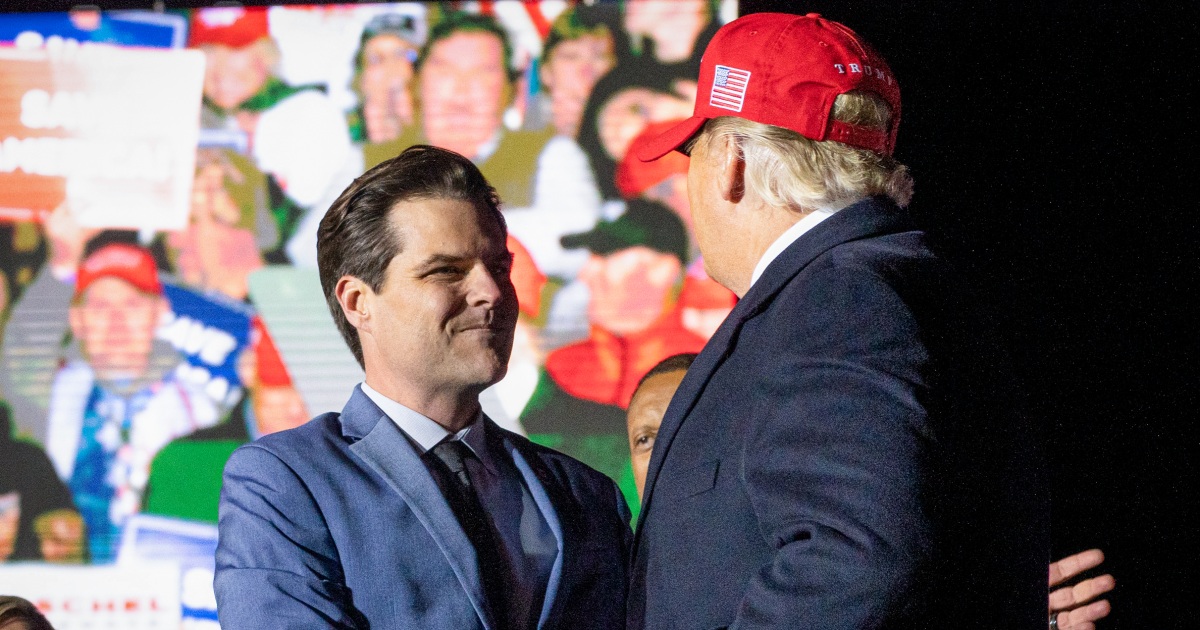Matt Gaetz’s withdrawal Thursday as a candidate for attorney general illustrates the roadblocks President-elect Donald Trump could face as he tries to convert his campaign of “retribution” into a governing coalition capable of working within the realities of Washington.
Gaetz, until recently a congressman from Florida, embodies Trump’s grievance- and vendetta-driven agenda like few others can. He has been one of Trump’s most pugilistic defenders and the bleeding edge of MAGA resistance in Congress, even against his own Republican leadership.
In Gaetz, Trump would finally get the loyal attorney general he felt he never had in his first term.
But it was a tough sell from the moment Trump announced Gaetz as his choice eight days ago — in a pick that shocked much of Washington.
The Justice Department that Trump wanted him to lead had once investigated Gaetz in a sex-trafficking case it closed without charging him. Meanwhile, an unreleased report from a separate House Ethics Committee investigation also hung over Gaetz’s head, and details of what two women told the committee about their allegations he paid them for sex were beginning to trickle out.
The panel had investigated Gaetz off and on over three years on allegations including sexual misconduct, illegal drug use, accepting bribes and improper gifts, sharing inappropriate images on the House floor, misusing campaign funds and obstructing the investigation itself. Gaetz denied all of those allegations and stopped cooperating with the probe this year.
In the end, it was the “combination of the ethics report and opposition among Senate Republicans” that doomed Gaetz’s candidacy, a senior Senate aide told NBC News.
Gaetz appeared too mired in scandal to survive a confirmation vote in the Senate.
“While the momentum was strong, it is clear that my confirmation was unfairly becoming a distraction to the critical work of the Trump/Vance Transition,” Gaetz wrote on X. “There is no time to waste on a needlessly protracted Washington scuffle, thus I’ll be withdrawing my name from consideration to serve as Attorney General.”
Gaetz’s hasty retreat is also emblematic of how Trump and his team often reject the conventions of Capitol Hill. Although Gaetz’s liabilities and legal troubles were well-documented, deeper vetting by Trump’s team might have unearthed details of the ethics probe sooner. And there was little, if any, effort to take the temperature of senators before Trump surprised the political world with his announcement last week.
At least five Senate Republicans were planning to vote against Gaetz and had communicated to other senators and those close to Trump that they were unlikely to be swayed, according to multiple people with direct knowledge. They are Mitch McConnell of Kentucky, Lisa Murkowski of Alaska, Susan Collins of Maine and Markwayne Mullin of Oklahoma, as well as Sen.-elect John Curtis of Utah.
Gaetz, accompanied by Vice President-elect JD Vance, a senator from Ohio, met with 11 senators Wednesday.
“My read is that he genuinely wanted it but had no real plan to overcome opposition,” a source familiar with Gaetz’s meetings said. “No strategy.”
“Not shocking that this is the outcome. Maybe a bit surprising it happened so fast,” this person added.
At least 20 — and perhaps as many as 30 — Senate Republicans were very uncomfortable about having to vote for Gaetz on the Senate floor, one of the sources said. Gaetz could afford to lose only three Republicans.
“I thought it was problematic from the beginning,” Sen. Mike Rounds, R-S.D.
“There was perhaps some information out there that the president was not aware of when he made the original recommendation,” Rounds said of Gaetz’s withdrawing. “In this particular case, that appears to have been what happened, and it may very well have been because of advice from the Senate, rather than consent from the Senate.”
Gaetz made the call to withdraw on his own and notified Trump of his decision earlier Thursday, two people with direct knowledge said.
One of the sources recounted having observed no internal pushback when Trump informed his team of his pick for attorney general, even though multiple staffers did not believe Gaetz could be confirmed. Senate leadership was not asked in advance about the pick, this person said.
The second source acknowledged that confirming Gaetz was always going to be an uphill battle and said Trump is expected to meet “very soon” with a new round of attorney general prospects, with no particular person at the top of the list.
Trump has other confirmation challenges ahead. His choice for defense secretary, Pete Hegseth, is a former Fox News host who has said women should not serve in combat and has been accused of, but never charged with, sexual assault. Trump also intends to nominate anti-vaccination activist Robert F. Kennedy Jr. for health and human services secretary and former Rep. Tulsi Gabbard of Hawaii, who has been accused of amplifying Russian propaganda, for director of national intelligence. Before Gaetz withdrew Thursday, Trump allies were pushing hard on GOP senators and other ambitious Republicans to publicly support his embattled Cabinet picks.
A person close to Trump said by the transition team “welcomed” Gaetz’s withdrawal, adding that “the [House Ethics] report started to leak out and there was no way for Matt to make it.”
Many officials at the Justice Department were also breathing sighs of relief Thursday.
“Certain events, like the sun chasing away the dark of night, are not surprising, they’re expected. But that doesn’t stop me from being grateful for each sunrise,” an official said. “I now know what is going to be the first feather on my gratitude handprint turkey this Thanksgiving.”

